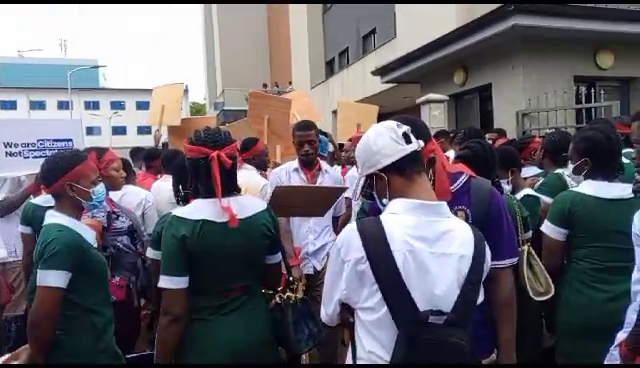The healthcare system in Ghana is facing a significant crisis as the Ghana Registered Nurses and Midwives Association (GRNMA) continues its nationwide strike, leaving public hospitals understaffed and patients struggling to access adequate care. The core issue fueling the strike is the government’s failure to implement agreed-upon improvements to the nurses’ and midwives’ conditions of service. Despite an emergency meeting between the GRNMA, the Ministry of Health, and other stakeholders, no resolution has been reached, further exacerbating the already strained healthcare landscape.
The crux of the disagreement lies in the government’s claim of budgetary constraints, which they cite as the reason for their inability to meet the GRNMA’s demands. These demands, which include improvements to salaries, allowances, and working conditions, were presented to the government in January, with the expectation that they would be incorporated into the year’s budget. The GRNMA leadership expressed their disappointment and frustration at the government’s explanation, highlighting the fact that they had anticipated the budgetary allocation for these improvements. This perceived lack of planning and prioritization on the part of the government has further solidified the union’s resolve to continue their strike action.
The government’s proposed solution of postponing the implementation of the agreed-upon conditions of service until 2026 has been met with strong resistance from the GRNMA. The union considers this proposal unfair and a tactical maneuver to avoid paying arrears. They argue that accepting such a delay would effectively negate the previously negotiated terms and reset the bargaining process, essentially erasing the progress made in securing better conditions for their members. This proposal has further deepened the divide between the two parties and underscores the government’s perceived disregard for the plight of healthcare workers.
The GRNMA’s National Council is now tasked with reviewing the government’s proposal and charting the association’s next course of action. While the strike continues, the impact on healthcare delivery is becoming increasingly severe. Public hospitals are struggling to cope with the shortage of nurses and midwives, leading to delays in treatment, reduced quality of care, and heightened risks for patients. The ongoing strike is a stark reminder of the vital role nurses and midwives play in the healthcare system and the potential consequences when their concerns are not addressed.
Despite the impasse, the Ministry of Health maintains its commitment to dialogue and negotiation. The Ministry’s spokesperson emphasized their willingness to consider counter-proposals from the GRNMA and adjust their position if necessary. This apparent openness to further discussions offers a glimmer of hope for a potential resolution. However, the government’s initial response and the significant gap between the two parties’ positions suggest that a swift resolution is unlikely. The success of future negotiations hinges on the government’s ability to demonstrate a genuine commitment to addressing the GRNMA’s concerns and finding a sustainable solution that recognizes the value of healthcare workers.
The ongoing strike by the GRNMA underscores the broader challenges facing Ghana’s healthcare system. The government’s budgetary constraints, coupled with the increasing demands on healthcare services, have created a complex situation that requires careful consideration and collaborative problem-solving. The resolution of this strike will require a significant commitment from both the government and the GRNMA to prioritize the needs of patients and the well-being of healthcare workers. A failure to reach a mutually acceptable agreement will have far-reaching consequences for the health and well-being of the Ghanaian population and could further erode public trust in the healthcare system. The current situation highlights the urgent need for a comprehensive and sustainable approach to healthcare funding and resource allocation in Ghana.


